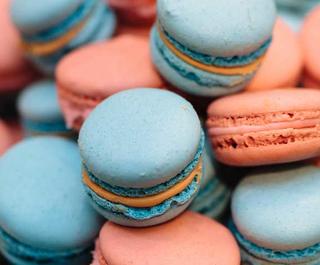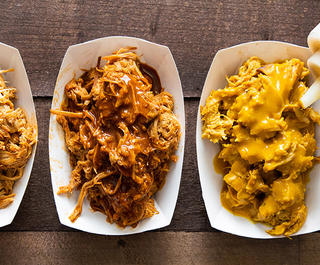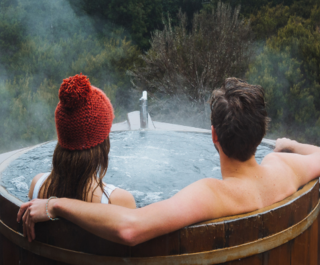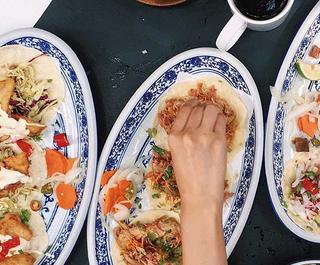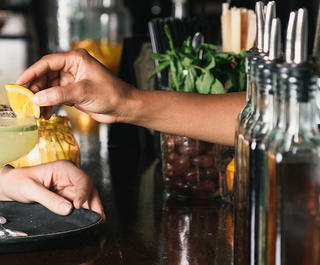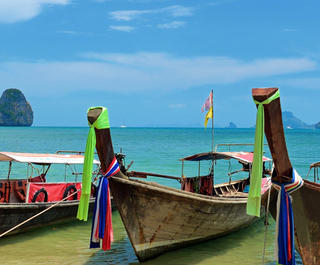
New York has Mad Men fever. The final season of the Manhattan advertising drama, set in the Sixties, will return Sunday, April 5 in the United States, and not since The Sopranos ended in 2007 has there been so much hype and anticipation around a TV show.
The Museum of the Moving Image in Queens has just launched Matthew Weiner’s Mad Men, a three-month exhibition featuring costumes, props, video clips and advertising art from the series.
NYC & Company, the city’s tourist promotion arm, has partnered with 34 New York restaurants for Mad Men Dining Week – a liquid lunch featuring two cocktails and two courses for $19.69 (A$25.50).
The Film Society of Lincoln Center recently presented Mad Men: End of an Era – screenings and interviews with the creator Weiner and the main stars.
Meanwhile, a Mad Men-themed statue has been unveiled outside the Time & Life building on 6th Avenue – the fictional location of ad agency Sterling Cooper & Partners in the series.
Don Draper’s own creative team could hardly have crafted a more thorough roll-out, although I suspect he might have thrown his rocks glass at a window in response to the statue idea.
Questions are being asked: will Don rise again, drink himself to death or have his true identity revealed? Will Peggy find love and professional respect? What’s in Joan’s wardrobe? And what will Roger say next? (Has any character in television history been given greater lines than New York’s favourite dandy?)
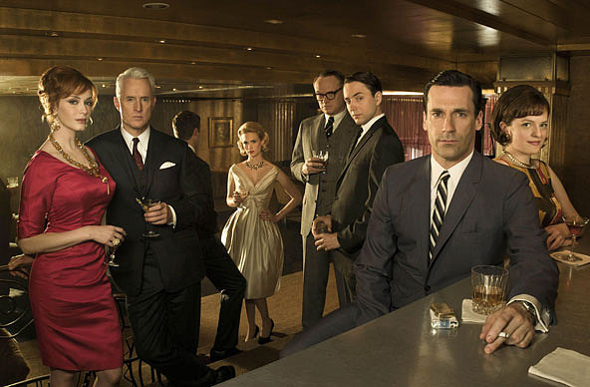 Follow in the footsteps of your favourite Mad Men characters
Follow in the footsteps of your favourite Mad Men characters
And yet, compelling as the characters in Mad Men are, the real star of the show, the one certainty that never lets you down, is New York City. “If I’m going to die I want it to be in Manhattan,” says accounts man Pete Campbell early on in the series, and you get a strong sense that the other characters feel the same way.
Mad Men is a paean to the power, style, fashion, decadence and relentless ambition of New York City, as evocative of the era as Gatsby was of the Roaring Twenties.
“The nostalgia of the period is what people are so drawn to,” says Josh Hirsch, founder of Sidewalks of New York, which runs two Mad Men walking tours, one of which features cocktails at three locations. “People perceive it to have been a simpler time, but it wasn’t at all.”
Creator Matthew Weiner (also a writer on The Sopranos) is famously meticulous about the period. While every episode except the pilot was shot in Los Angeles, almost all the New York hotels, bars, restaurants and shops featured on the show are real, and either still exist today or did in the Sixties.
Attention to detail is such that cocktail menus, wall art and furniture are recreated.
There are advisers to determine what items would have been on Madison Avenue executives’ desks in 1967. The public relations team at venerable Midtown speakeasy The 21 Club has sent Sixties photographs of the restaurant to Weiner hoping to get a mention or even a scene. No luck so far.
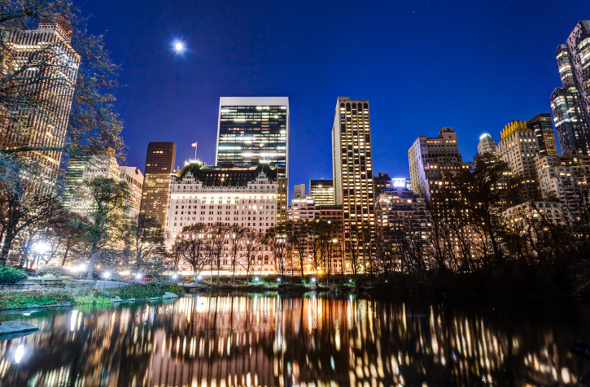 New York City is a playground of sophisticated fun day or night (image: Getty)
New York City is a playground of sophisticated fun day or night (image: Getty)
In some ways Mad Men was a show waiting to happen.
Retro bars and classic cocktails were already part of the zeitgeist when the show first aired in 2008, but watching glamorous men and women sip Manhattans and Old Fashioneds in bars has added to the authenticity. Classic fitted suits, tailored jackets and slim ties have made such a comeback even Banana Republic brought out a Mad Men line.
In celebration of the final season we present some seminal scenes from New York landmarks, tell you what they were then, what they are today, and, if no longer around – suggest some alternatives.
Bars & Restaurants
1. The Stork Club
The scene: Oklahoma bootlegger Sherman Billingsley’s decadent, celebrity-packed former speakeasy – Sinatra, Marilyn, Hemingway and Liz Taylor were regulars – is where weasel insult comedian Jimmy Barrett intimates to Don’s wife Betty that Don is having an affair with his wife, Bobbie. Things are never the same again chez Draper.
Today: Demolished in 1966 the site is now the pocket-sized Paley Park, a rare Midtown green space. A good alternative would be The 21 Club, a block south of the Stork.
Founded in 1922 it is the last of the original speakeasies, and still a prestigious power player hang-out. In a clubby, multi-floor space, today’s thin-tie brigade sip Southsides (Tanqueray gin, muddled mint) at the counter and dine on oysters and pork belly in the low-ceilinged main room. (3 East 53rd St)
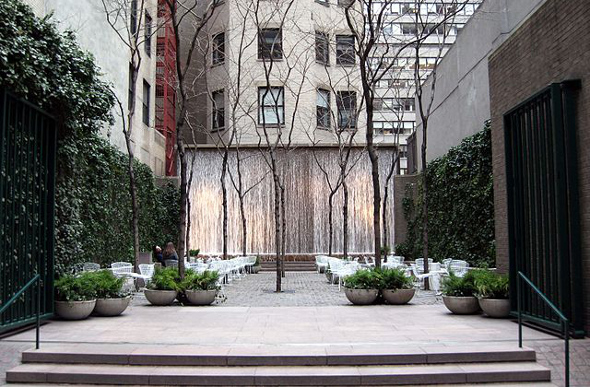 Paley Park now stands in place of The Stork Club (image: Jim Henderson)
Paley Park now stands in place of The Stork Club (image: Jim Henderson)
2. Grand Central Oyster Bar
The scene: Don and Roger indulge in an epic martini and oyster lunch bender in this glorious high-ceilinged raw bar in the basement of the Beaux-Arts Grand Central Terminal. Roger later throws up in the office after he and Don are forced to take the stairs – Don’s plan for him all along.
Today: The only things that have changed since it opened in 1913 are the prices. Oysters are flown in fresh from across the US, and veteran bartenders in white jackets hold court under the glittering vaulted Rafael Guastavino-designed ceiling. Come before 5pm to avoid the commuter rush.
3. PJ Clarke’s
The scene: Peggy Olson celebrates her first successful campaign as a copywriter by drinking beers and doing the Twist in this cosy East Midtown tavern, established 1884. Pete Campbell, with whom she had an affair, looks on disapprovingly.
Today: A last old-school hang-out among Midtown’s steel and concrete, PJ’s is as good as ever. Preppy Upper East Side locals come for bacon cheeseburgers in the red-checked tablecloth back room, while a post-work crowd shuck oysters and sip gin Martinis poured by aproned bartenders in the white-tiled front bar.
It’s tiny – we wonder where Peggy found the space to dance.
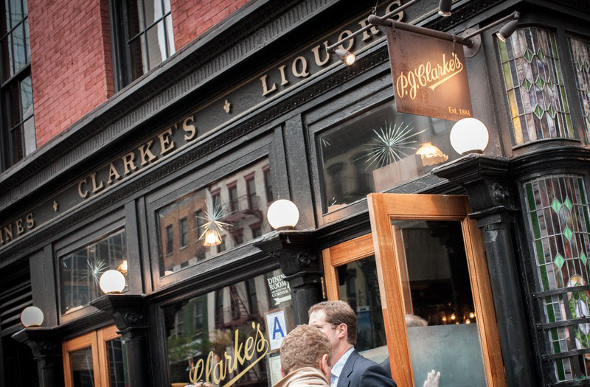 Outside the historic PJ Clarke's in Manhattan (image: PJ Clarke's)
Outside the historic PJ Clarke's in Manhattan (image: PJ Clarke's)
There's no shortage of things to do in NYC. Sam’s top 12 things to do in NYC
Film lovers need to know this. 6 Hotels Perfect For Film Lovers
4. Minetta Tavern
The scene: Abe invites Peggy to dinner at this low-lit Greenwich Village staple directly opposite Café Wha (where Dylan first performed and Hendrix was “discovered”). Back then, Minetta was a down home red-sauce joint and a boozy hang-out for boxers, beatniks and writers.
Peggy is convinced Abe is going to propose. Instead, he suggests they move in together. “The steak’s supposed to be good here,” Abe tells her.
Today: The Minetta faded in the Seventies, but British restaurateur Keith McNally of Balthazar fame rescued it in 2009, giving it his signature Parisian bistro makeover. It does an even better steak today: Abe could never afford the $61 (A$77) Bone-In New York strip. Gwyneth Paltrow had her cookbook launch party here.
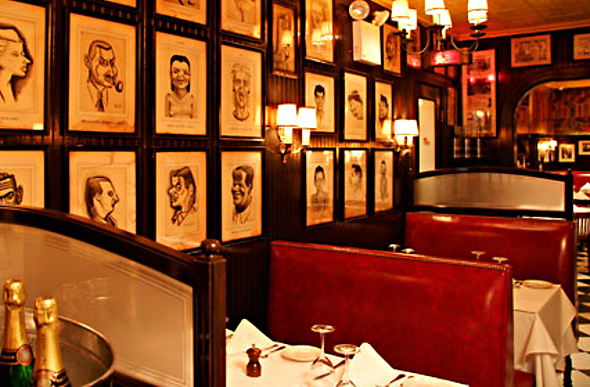 Famous caricatures line the walls of The Minetta
Famous caricatures line the walls of The Minetta
5. Sardi’s
The scene: Don meets mistress Bobbie Barrett at this Broadway haunt and runs into old flame Rachel Menken and her new husband. You can make out the red banquettes and caricature drawings of the celebrity patrons on the walls.
Today: Somewhat dated, but still a classic theatre-district spot with a discounted menu for working actors. The Jumbo crab cakes and Shrimp Sardi – sautéed shrimp in garlic sauce – are excellent; caricatures of contemporary Broadway stars would since have been added to the wall of fame.
6. Benihana
The scene: Before there was sushi in America, there was Benihana. The now global teppanyaki (Japanese grill) chain was started at this location in 1964 by 25-year-old wrestler and chef Hiroaki “Rocky” Aoki.
Don brings Bethany here on a date and to learn about Japanese culture – preparation for a Honda pitch. During dinner, rival Ted Chaough comes over. “Who’s that?” Bethany asks. “Some fly I keep swatting away,” Don replies.
Today: Benihana has gone on to become a billion dollar global enterprise, but while the West 56th St original is still there, it’s looking somewhat forlorn.
Sushi has long since surpassed Japanese stir-fry and chefs doing tricks with steak knives in the American imagination. Head instead for Sushi Yasuda where protégés of master chef Naomichi Yasuda roll and cut exotic fish with the precision of orchestra maestros.
Hotels
1. The Pierre
The scene: When Don, Roger & Co start their own agency rather than get bought out by McCann Erickson, they temporarily set up shop in a suite at this luxury 41-storey icon overlooking Central Park.
Built in 1930, it became the first hotel to offer radios and televisions in all guest rooms in 1950. In another episode Trudy, Pete Campbell’s wife, insists on bathroom fixtures “just like the Pierre”. Good eye, Trudy.
Today: Now owned by India’s Taj group, which gave it a $100 million renovation, they have kept elements of its Old New York charm: wood-panelled lifts manned by uniformed operators, and vintage mail chutes on each floor. It’s home to the only US outpost of London restaurant Le Caprice. Roger would approve.
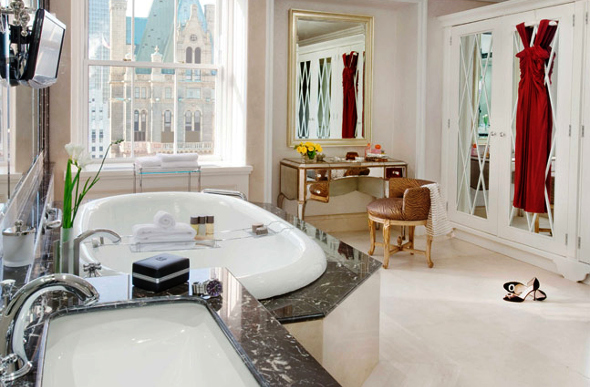 Stunning bathrooms are a cherry on top at the Pierre (image: The Pierre)
Stunning bathrooms are a cherry on top at the Pierre (image: The Pierre)
2. Roosevelt Hotel
The scene: The hotel is just around the corner from the fictional Sterling Cooper offices at 405 Madison Ave; Don moves into a room here when Betty kicks him out in season 2.
Pete follows suit when his marriage hits the rocks, and it’s here, in season 6, that Don and Peggy, now at a different agencies, make rival pitches for the Heinz Ketchup account. Don listens to Peggy’s pitch through the door.
Today: Built in 1929 and taking up an entire city block just north of Grand Central Terminal, it underwent a $65 million overhaul in 1997 but retains its Old New York style. The lobby – red carpets, glittering chandeliers, gold leaf ceilings – is like a gilded age museum piece, and the plush mahogany-panelled Madison Club Lounge (where gay art director Salvatore has a clandestine date) has barely changed since the Thirties.
Order a Kentucky Sidecar. In summer the new place to be is in a cabana at the hotel’s chic rooftop bar, mad46 – although it’s more Meaghan’s age demo than Don or Roger’s.
3. The Elysee
The scene: Peggy visits former Sterling Cooper creative Duck Philips in his suite at this understated Midtown classic expecting a job offer. Duck has other things on his mind, and they begin an unlikely affair.
Today: Built in 1926, it’s famous for the Monkey Bar, a piano lounge off the lobby, decorated with a series of comic human-monkey murals by caricaturist Charlie Wala.
In 2009 Vanity Fair editor Graydon Carter took over the lounge, elevating it to the same celebrity-rich status it held in the Fifties and Sixties, when Marlon Brando and Tennessee Williams (who lived in the hotel for 15 years) were regulars.
4. The Waldorf Astoria
The scene: Hotel tycoon Conrad Hilton summons Don to his suite at the Waldorf to advise him on an ad campaign for Hilton Hotels. “I want the moon,” he says. Don later makes the mistake of not taking him literally.
Today: Hilton Hotels still runs the venerable Old World-meets-Art Deco masterpiece on ritzy Park Avenue. Order the eponymous Waldorf Salad along with a rare porterhouse steak in its wood-panelled Bull & Bear restaurant.
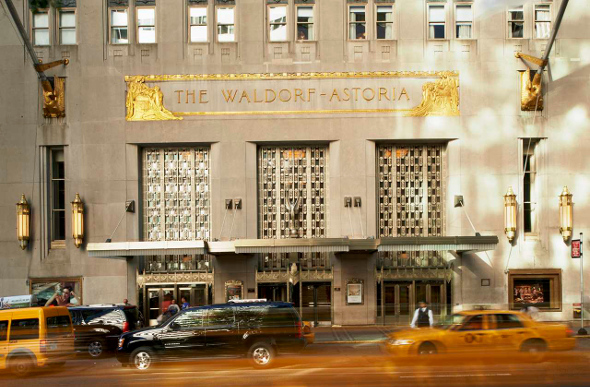 Step into the Waldorf Astoria and you'll be sharing a space with history
Step into the Waldorf Astoria and you'll be sharing a space with history
Shops/Department Stores
1. Paul Stuart
The scene: Roger gets his suits at this New York institution, a one-stop shop for New York dandies for close to 70 years.
Today: Expect everything from grey flannel suits to beaver top hats and skull-and-crossbones braces. The service is amazing. Next door is Brooks Brothers (at 1180 Madison Ave), the oldest retailer of men’s clothing in the United States (F Scott Fitzgerald wore Brooks Brothers’ suits) and it's still the classiest men’s clothing store in America. Mad Men actor Jon Hamm is dressed by Brooks Brothers.
2. Bloomingdales
The scene: Pete is embarrassed when he is caught returning a Chip ’n’ Dip wedding gift at Bloomingdales.
Today: Established in 1886, the ultimate Manhattan department store is still the first name on gift lists for Upper East Side heiresses and Jersey suburbanites
3. Menkens
The scene: Rachel Menken meets with Sterling Cooper to get them to rebrand her father’s struggling department store. Don is soon having an affair with her, and gets a rooftop tour of the shop.
Today: Menkens is that rare Mad Men location that does not actually exist. We suspect it’s a stand-in for the elegant Bergdorf Goodman on Fifth Avenue, which also had a financial slump in the Sixties.
4. Heller’s Luxury Furs
The scene: In season 4, episode 6, we discover a young Don Draper working at this small luxury furrier. There he meets Roger Sterling, who comes in for a mink for his girlfriend, Joan Holloway.
Today: As with Menkens, Heller’s does not exist. Instead, for all your fur needs visit Dennis Basso conveniently located on Madison Ave
5. Paul Mole
The scene: Pete Campbell gets his hair done at this Upper East Side barbers, founded in 1913.
Today: Generations of New Yorkers have been coming here for their haircuts – and they still do.
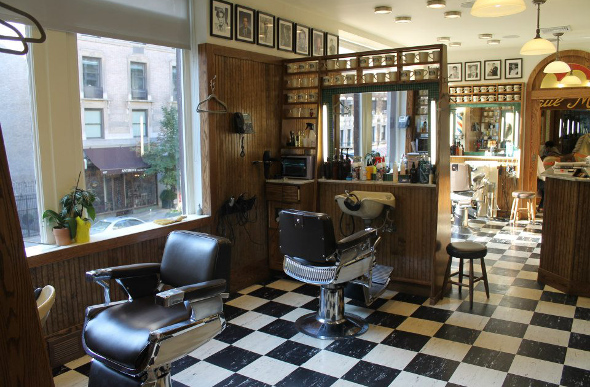 Paul Mole is still a popular barber shop (image: Paul Mole)
Paul Mole is still a popular barber shop (image: Paul Mole)
Mad Men Essentials
Sidewalk Tours of New York offers daytime and evening Mad Men Walking Tours on Thursdays and Fridays, visiting bars, hotels and other sites from the show. Day tour: $59 (A$75); evening tour $150 (A$275) (includes three cocktails and a plate of oysters).
The exhibition Matthew Weiner’s Mad Men is at the Museum of the Moving Image from March 14-June 14
This article was written by Douglas Rogers from The Daily Telegraph and was legally licensed through the NewsCred publisher network.
.........................................................................................................................................................
Visit your local Flight Centre or call 131 600 for more advice and the latest deals on travelling to New York
.........................................................................................................................................................


